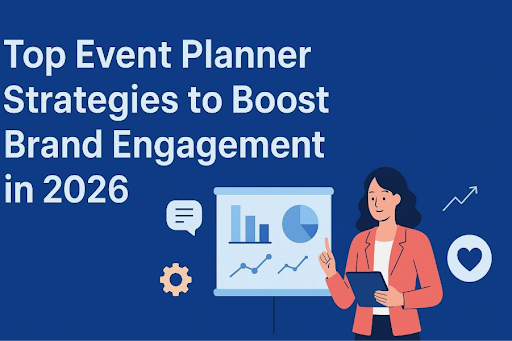There is an urgent need to discover new and valuable methods of reaching out to the audiences in the current dynamic market. Events have emerged as the most powerful platform – the most ideal combination of interaction, storytelling, and emotional attachment. Be it a corporate meeting, a product introduction, or an immersion event, an experienced Event Organizer Company in India plays an important role in bringing ideas to life through memorable brand experiences.. In this year as well, various new and novel strategies are coming into the limelight that have the potential of taking the brand engagement even further.
What are Event Planner Strategies?
The techniques of planning, managing, and executing events are basically known as event planner strategies, which are planned and thought-out methods of organising events. Such strategies define the theme of the event, its format, the experience for the audience, and technology. These plans will dictate the level of engagement of the attendants, the duration at which they will be engaged, and the extent to which the message of the brand will be conveyed.
Personalisation, smart technology integration, sustainability practices, hybrid event format, gamification, and content-driven planning are some of the aspects in event planner strategies. Their main objective is very basic: they want the event to be smooth, organised, and most importantly, engaging and lasting.
Why Is It Important to Use These Strategies?
In today’s world, strategic planning has become a very important part of every event, because events have to juggle both short attention spans and high audience expectations. If we have no clear strategy, no matter how much budget is spent on the event, it can easily become forgettable. Proper planning makes sure that all the aspects, such as the venue choice and the decoration, content, utilisation of technology, schedule, and general attendee experience, run smoothly and in a logical order. This not only enables the organisation of the event but also gives the event an exciting and captivating experience for the audience.
Strategic event planning helps brands:
- Deliver consistent and meaningful experiences.
- Keep attendees engaged throughout the event.
- Communicate brand values clearly and creatively.
- Increase participation and emotional connection.
- Measure success using data and analytics.
These are the strategies that a professional event planner in India would employ to ensure maximum ROI, as well as build a strong brand presence that will leave lasting impressions that may last even after the event is over.
Top Event Planner Strategies in 2026
- Hyper-Personalization
Today’s audiences expect personalisation; it is not a luxury, but it has become a necessity in events. By using event planners’ data smartly, you are able to personalise invitations, seating arrangements, agenda suggestions, and even event activities. By which attendees feel that the event is specially curated for them, through which the brand automatically becomes stronger.
- Immersive Technology Experiences
The event industry has been transformed entirely by technology. The multi-sensory experience makes the experience visually striking with the aid of such tools as Augmented Reality (AR), Virtual Reality (VR), interactive LED systems, and holographic presentations. The majority of the event planners take it to the next level of storytelling with these technologies, more interaction, and ensure the event is really memorable.
- Hybrid Event Formats
The trend of hybrid events remains high due to the fact that they offer the best of the two worlds. The vibrancy of a physical event is compounded by the availability of an online approach. This enables the brands to communicate with more people without losing out on engagement. Other features, such as inclusivity, real-time analytics, and scalability, also make hybrid events ideal in the current dynamic audience requirements.
- Sustainable and Eco-Friendly Practices
Modern brands are paying attention to sustainability today. Planners are making green events through biodegradable materials, online invitations, eco-friendly decoration and vendors that are carbon neutral. Not only are these practices environmentally friendly but they are also attractive to the audiences who ascribe to socially conscious and responsible brands.
- Gamification for Engagement
Gamification, like points leaderboards, fun challenges, and rewards, is making events lively and interactive. This approach helps attendees to participate actively. Through mobile Apps or on-ground tasks, boost gamification energy and make the event experience entertaining and memorable.
Content & Storytelling: A Powerful Engagement Tool
One of the most effective strategies is the focus on narrative-based content. The contemporary viewer does not only need information but wants to read the stories that he/she can connect with, be moved by and have fun along the way. That is why event planners are collaborating with brands to produce themed experiences, participatory installations, interactive keynotes, and presentation pieces that are aesthetically pleasing.
The emotional connection, improvement of brand, and making sure that the attendees will walk away with a definite idea of what the brand actually means are the effects produced by storytelling. It can be a new product or the company reaching a milestone, where storytelling will help make the event more than just a mere meeting.
Conclusion
It has become important to adopt innovative event strategies with the evolving audience expectations. Once personalisation, technology, sustainability and good storytelling are united, then events become solid engagement platforms.
Such experiences are created by the brands with the help of a professional event planner in India and impress the audience, as well as make them emotionally connected. At the conclusion of this paper, we are able to conclude that an effective event not only entertains but also motivates, and a brand creates a solid connection with the audience.

